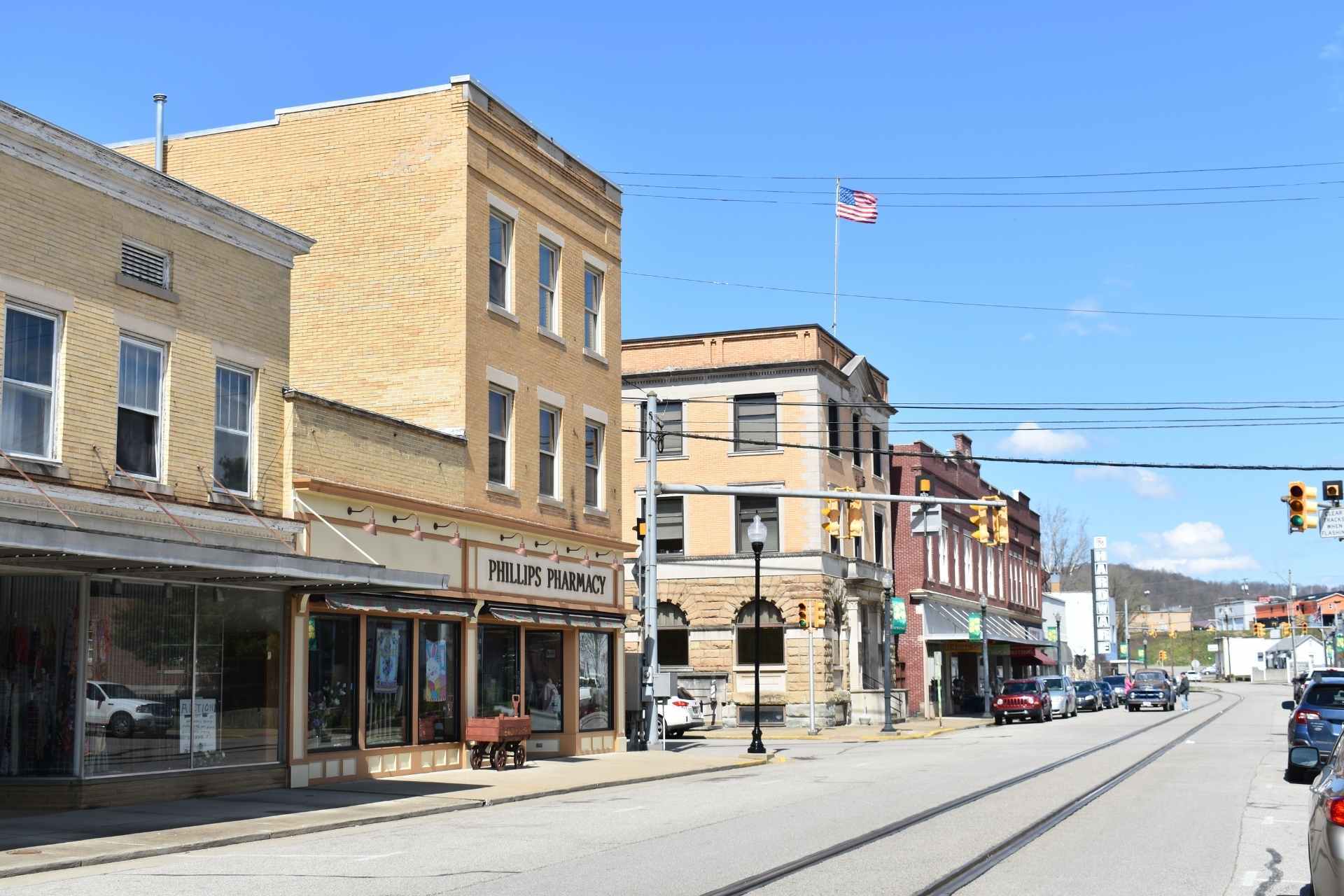Editor’s note: This story was originally published by Mountain State Spotlight. Get stories like this delivered to your email inbox once a week; sign up for the free newsletter at https://mountainstatespotlight.org/newsletter
By Douglas Soule, Mountain State Spotlight
ST. MARYS — It was an uncharacteristically calm moment for a weekday afternoon in the Bank Barber Shop. Mark Bailey sat at his desk, waiting for his next customer, as an employee used electric clippers on a man’s gray hair.
Bailey has lived in St. Marys since third grade. The town of fewer than 2,000 sits on the banks of the Ohio River in Pleasants County. And for the past four decades, it’s benefited economically from the Pleasants Power Station: a coal-fired power plant only a few miles south of Bailey’s downtown barber shop.

“We’ve just been so fortunate to have [the power plant] for all these years,” Bailey said.
But the plant’s long life may be nearing an end. As energy companies across the country retire older coal plants in favor of facilities that use cleaner, cheaper natural gas and renewables, the Pleasants Power Station’s owner last month announced a goal of becoming 100% carbon free. As a result, the company plans to sell or close the plant next year.
In Pleasants County, concern about what comes next is widespread.
“There’ll be a big impact on the community,” Bailey said.
For Doug Renner — one of more than 150 people employed by the plant — news of a possible closure puts not only stress and strain on him, but his entire family.
“[My son] worries about my job in a way that a 15-year-old shouldn’t,” he said, voice cracking, in a phone interview. He paused, excused his tears and took a deep breath.
“In the Bible,” he said, “it says we shouldn’t worry about tomorrow. But any good father, any good parent, would want to make sure their son or daughter had not necessarily the most expensive life, but be able to have a running start on life.”
For Renner, his job at the plant has made it possible to offer his son that running start, like planning to help him through college.
No choice but to move forward
Bailey has lived in Pleasants County long enough to remember life before the power plant. His dad worked to build it: he was assigned to help erect one of its cooling towers, but was in the hospital on April 27, 1978, when the tower collapsed mid-construction.
Bailey drove by the tower minutes before the disaster, on his way to visit his dad. By the time he got to the hospital, the tower was down.
“[My dad] said, ‘What’s going on? And I said, ‘Dad, I think you just lost a lot of friends,” he said.
None of the 51 workers on the tower’s scaffolding at the time survived the collapse. It’s considered the deadliest construction accident in United States history.
The entire community was left in shock and mourning, with no choice but to keep moving forward. The power plant began operations the next year, in 1979. But in recent years, there’s been increased uncertainty about how long it can keep burning coal.
In 2018, residents were shook by an announcement that the plant could close. During a special session called by Gov. Jim Justice the next year, lawmakers rushed to approve $12.5 million in annual tax breaks to help keep the plant alive. A company spokesman denied an interview request and did not respond to emailed questions. A spokesman for the governor did not respond to a media request.
Both across the county and in West Virginia, companies have been retiring older coal-fired power plants in favor of cheaper sources of electricity. The fossil fuel has had new competition from other energy sources, like natural gas and renewables.
“It’s basically, ‘What’s the most cost effective way to generate electricity?’” said James Van Nostrand, the director of West Virginia University’s Center for Energy and Sustainable Development. “Earlier in the decade, it was all natural gas, and now wind and solar are catching up. And coal is a distant fourth.”
Plus, there’s the pollution. Burning coal emits vast quantities of carbon dioxide, which is hastening climate change around the globe. Other power plant pollution contributes to local health issues, including asthma, bronchitis and heart disease. And new emissions regulations have increased the expenses borne by coal-burning power plants.
Van Nostrand said the news of the Pleasants plant’s possible closure seemed inevitable.
“I’m not surprised at all; it’s been on the chopping block for years,” he said.
The domino falls
It’s not just plant employees and their families that would be affected by a closure. When such an economic engine sputters out, it has a domino effect, and the whole community loses.
Rodney Sayre, owner of St. Marys Hardware, said the announcement alone has hurt his business.
“The threat of that closing down I think has got people kind of pulling back,” he said. “They’re not going out starting big projects.”
Sayre doesn’t know what will happen to his store if the plant closes, but he knows it won’t be good. It’s already stressful, he said, owning a small hardware store and having to compete against larger chains like Home Depot and Lowe’s. Now, if the plant closes, he worries he might have to lay some of his employees off.
“We’re just trying to feed [our] family,” he said. “I’m obligated to make this a successful place so my employees can have long-term employment. That’s my feeling. I’m under that stress to make sure this is successful for them and for me.”
A loss of jobs — whether from the plant itself or businesses like Sayre’s — could lead to reduced support for organizations like Pleasants Community Foundation, which gives out scholarships and grants. This reduction in funding would come at the worst possible time, said the foundation’s executive director, Sheri Fleegle.
“With the loss of jobs, there is going to be a greater need for the kinds of funds that we provide, particularly the student scholarships,” she said. “The students are going to have a greater financial need in order to go to college if their family’s income is reduced.”
The secondary schools those students attend could also take a hit.
Next fiscal year, the Pleasants County school system is projected to collect around $6.7 million in taxes. Superintendent Michael Wells said if the plant closes, the system could lose $1.3 million of that tax revenue annually, only some of which could be made up.
Already, Energy Harbor’s announcement — along with the current high prices for materials — has delayed a project for HVAC improvements at St. Marys High School.
“If we’re not generating that money, then we’re going to have to look at [cutting] anything from programs to potentially some positions,” Wells said.
And the people who could lose their jobs from the plant and beyond might have to leave, creating a rip in the community’s social fabric.
“Obviously, you’ve got engineers, technicians and mechanics and all these specialty jobs down there [in the plant],” said Pleasants County Commission President Jay Powell. “But let’s face it, those same people are our Boy Scout leaders, there are coaches, there are deacons in our churches.”
For Doug Renner, leaving would be a last resort.
If he loses his job at the plant, Renner doesn’t plan to leave the county or move away from his family farm there.
“I cannot envision myself living anywhere else,” he said. He’s running for county commission in the upcoming election, and calls the area a modern- day Mayberry, referring to the quaint and friendly town from “The Andy Griffith Show.”
But staying might mean he has to commute hours away to support his family.
An uncertain future
Powell said while he’s worried about the future of the plant, he’s a lot more hopeful now than when Energy Harbor announced the transition in March.
“We’ve been blessed with multiple inquiries,” he said of companies that are interested in lengthening the plant’s life.
He wouldn’t reveal any names, but said there have been three kinds of groups interested in the plant: companies that want to repurpose the facility as a hydrogen power plant, coal companies interested in keeping the plant powered by coal, and groups interested in doing the same but using the electricity for cryptocurrency mining.
“Those entities that have inquired have been very forthright, and said they would love for the workers that are there to continue to work for them,” Powell said.
Powell said the county has continually worked to diversify its economy — recently, for example, a methanol plant announced it would be coming to the area.
“It wouldn’t be like the cupboard is bare by any means,” he said. “But it would certainly be tragic. It would be a blow to the community financially. And certainly more importantly to me those jobs, those good-paying jobs, that would be gone.”
For the time being, Powell said all the focus has to be on making sure that doesn’t happen.
“One hundred percent of our energies have got to be toward either that plant remaining open as a coal-fired power plant or it being repurposed,” he said.
Emmett Pepper, policy director for Energy Efficient West Virginia, says the writing has been on the wall for a while about a transition away from coal power, as the country moves towards a more carbon-neutral economy. But he says it’s necessary to invest other resources in areas where the coal industry has been displaced, or soon will be.
“There’s opportunities for diversifying economies and for supporting coal-affected communities, and I hope that there is funding available for that. And I hope that this company invests in the community as well,” he said. “Not just [to] soften the blow, but to put a plan into place to create economic activity that will help long term.”
There’s models for this. Pepper, as well as WVU’s Van Nostrand, cited one out of Centralia, Washington. With its local coal mine gone and its power plant soon to follow, the company owning both agreed to provide $55 million over a decade to fund an economic transition. An economic boom followed.
“We need to plan ahead,” Pepper said. “We should be putting money aside.”
Reach reporter Douglas Soule at douglassoule@mountainstatespotlight.org



























